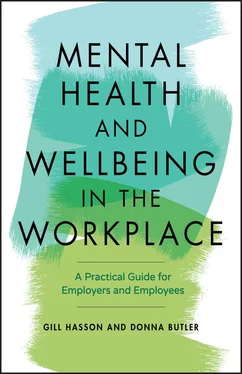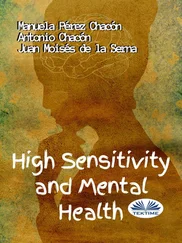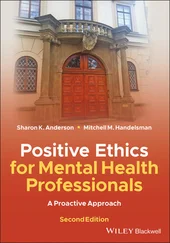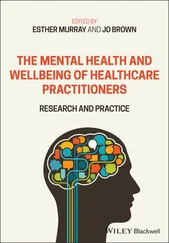Emotional and physical responses:
Feeling restless, agitated, or irritable
Feelings of guilt and worthlessness
Little self-confidence or self-esteem
Feeling down; a flat mood that doesn't shift; apathetic; empty and numb
Feeling detached; a sense of unreality
Little or no pleasure in life or things. Unable to see fun or humour in any situation
Unable to relate to other people, feeling isolated from them
Finding no pleasure in life or things you used to enjoy
Not looking forward to anything or planning anything
Feelings of hopelessness and despair.
How you might behave:
Distancing yourself from family and friends
Avoiding social events and activities you used to enjoy
Moving slowly or, unable to rest, always on the move.
Anxiety is the anticipation of trouble, misfortune or adversity, difficulties or disaster. Anyone can feel stressed and anxious from time to time; to feel fearful at the thought of, for example, an upcoming medical test, a presentation at work, a job interview, or an exam. It is a normal response to a stressful, or perceived stressful, situation. Whatever it is that you may be anxious about, you may feel that you've no control over what could happen; how events might turn out and how you'll cope if things do go wrong.
But, like all emotions, anxiety can have a positive effect; it serves as your internal alarm and prompts you to take necessary measures to prevent the worst case scenario from happening. Most of the time, once the stressful situation is over, anxious feelings subside. There are, though, times when feelings of anxiety are more permanent and entrenched and adversely affect your mental health. Being anxious about how to cope can lead to being depressed because you feel you have little or no control over what's happening.
Just as the symptoms of depression will vary from person to person, so will the symptoms of anxiety. Anxiety may be experienced in some of the following ways:
Emotional and physical responses:
Racing thoughts
Fretting and ruminating
Being jumpy and on edge, feeling ‘wired’, tense, irritable, impatient, angry
Distrusting of and/or aggressive with others
Irrational fears
Feelings of impending doom
Sensations of nausea, choking, or being unable to breathe or hyperventilating
Feeling panicky; pounding heart/increased heart rate, chest pain (sweating/muscle tension/shaky)
Fear of losing control
IBS, headaches, migraines.
How you might behave:
Becoming agitated, speedy; inability to rest
Seeking constant approval or reassurance
Needing to avoid or escape certain situations – social gatherings, for example, or being at work – any situation perceived as a threat
Obsessive and controlling behaviour
Taking a long time to calm down following upsets.
Excessive or prolonged stress can, when left unchecked, gradually build up and eventually result in burnout; a state of emotional, mental, and physical exhaustion which, although not applying to experiences outside the workplace, can still affect all areas of a person's life.
Looking at the factors influencing contact with health services, the 11th Revision of the International Classification of Diseases (ICD-11) describes burnout not as a medical condition, but as an occupational phenomenon. Burnout is defined as:
a syndrome conceptualized as resulting from chronic workplace stress that has not been successfully managed. It is characterized by three dimensions:
feelings of energy depletion or exhaustion;
increased mental distance from one's job, or feelings of negativism or cynicism related to one's job;
reduced professional efficacy.
Burn-out refers specifically to phenomena in the occupational context and should not be applied to describe experiences in other areas of life.
With burnout, problems seem insurmountable, everything looks bleak, and it's difficult to muster up the energy to care, let alone do something to help yourself. You probably feel that you're in over your head or have little control over the situation; you don't see any hope of positive change in your situation. Caring seems like a total waste of energy. You've run out of resources to cope. Pretty much every day is a bad day.
Emotional and physical responses:
Lack of energy, exhaustion/extreme tiredness, mental fatigue
Being unable to concentrate, increased emotional and cognitive distance from one's job
Low mood, depressed, negative, anxious, irritable, tearful
Frustrated, angry with work, workplace, and colleagues
Disillusionment, resentment, bitterness, embitterment/cynicism related to one's job. Feeling unable to continue in the job
Feeling traumatized, trapped, broken
Dissociative feelings; emotionally cut off, empty, numb
Hopelessness, helplessness, beyond caring, giving up, feeling at rock bottom.
How you might behave:
Reduced performance at work
Neglecting your own needs, either because you're too busy or you don't care anymore
Little or no compassion for others, dismissive of others
Inability to relate to others emotionally, distancing yourself from them
Lack of energy or enthusiasm for interests outside of work.
Being super busy overloads us with stress and anxiety – Excessive ‘busy-ness’ is usually a sign that all is not well. When I'm reaching burnout I start fixing too many dates and writing too many e-mails. I become so uber-busy that things don't make sense anymore.
Ruby Wax
According to the Diagnostic and Statistical Manual of Mental Disorders , trauma is defined as ‘exposure to actual or threatened death, serious injury, or sexual violence; either directly, as a witness or by learning it happened to a loved one or friend’.
Trauma does not just happen to other people – it happens to us, our friends and family and our neighbours. While humans are an extremely resilient species, able to rebound from relentless wars, family violence and manmade disasters, experiences like these inevitably leave traces: on our minds, our emotions and even on our biology and immune systems. This matters not just to those who are directly affected, but to the people around them.
Bessel van der Kolk
There can be varying levels of trauma and traumatic stress. Whilst many individuals who are exposed to trauma can move on from it, for others it's not that simple. Trauma can leave ongoing symptoms that need professional support and psychotherapeutic intervention. Part of our brain can be good at denying the trauma has happened; however, the brain and the symptoms associated with the original trauma can be re-activated by a slight sense of danger.
Emotional and physical responses:
Ruminating and replaying on a loop the memories in your mind
Intrusive flashbacks and disturbing images and thoughts
Feeling trapped in the past events
Nightmares, waking in terror
Anxiety and feeling on edge, fearful and constantly ‘on guard’, seeing danger everywhere
Feeling out of control, vulnerable, hopeless, and helpless
Feelings of despair and bleakness, sadness, depression, grief
Survivors guilt, self-blame, and self-criticism
Angry, violent outbursts
Numbness and feeling empty.
How you might behave:
Withdrawing from family/friends/loved ones/colleagues
Avoiding things/people related to the traumatic event
Difficulty trusting people
Panic and being easily startled
Читать дальше












